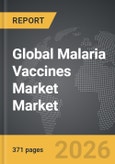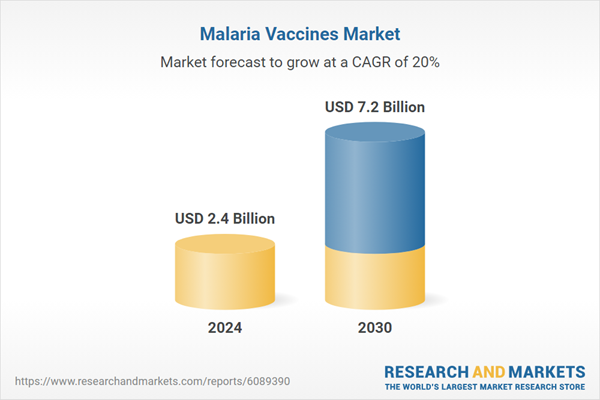Global Malaria Vaccines Market - Key Trends & Drivers Summarized
Why Are Malaria Vaccines a Pivotal Milestone in Global Public Health?
Malaria vaccines represent a breakthrough in the fight against one of the world's most persistent and deadly infectious diseases. With malaria claiming hundreds of thousands of lives annually - mostly in Sub-Saharan Africa and disproportionately among children - effective immunization has long been considered the “missing link” in global malaria control strategies. While mosquito control, antimalarial drugs, and rapid diagnostic tools have made significant progress, vaccines offer the potential to provide long-term protection, reduce transmission, and complement existing interventions.The introduction of the RTS,S/AS01 (Mosquirix) vaccine, followed by the R21/Matrix-M vaccine, marks a historic shift from reactive malaria control to proactive prevention. These vaccines are designed to target the Plasmodium falciparum parasite, the most deadly malaria strain. Their deployment in high-burden countries has already begun, with global health alliances and public-private partnerships accelerating access in resource-limited settings. The momentum behind vaccine-based solutions is building as health systems seek scalable, cost-effective tools to achieve elimination targets.
How Are Research, Funding, and Deployment Strategies Evolving?
The malaria vaccine landscape is evolving rapidly, driven by a surge in public and philanthropic investment, increased engagement from biotech firms, and support from global organizations such as WHO, Gavi, and UNICEF. Clinical trials for next-generation vaccines are expanding, targeting broader parasite strains and longer-lasting immunity. Innovations in vaccine delivery platforms - such as nanoparticle-based formulations and mRNA approaches - are being explored to overcome efficacy and logistics limitations.Simultaneously, coordinated rollouts in countries like Ghana, Kenya, and Malawi are informing future distribution models. Integration with routine immunization programs is critical to achieving widespread coverage, and health systems are building infrastructure for cold chain, training, and community engagement. In parallel, demand forecasting tools and digital health registries are being employed to manage vaccine inventories, monitor coverage, and track side effects. These ecosystem-level efforts are critical to turning scientific advances into measurable public health outcomes.
Which Regions and Populations Stand to Benefit the Most?
Sub-Saharan Africa remains the epicenter of global malaria incidence, accounting for over 90% of cases and deaths annually. Children under five and pregnant women are the most vulnerable groups, and vaccination programs targeting these populations can significantly reduce morbidity and mortality. The broader tropical belt, including parts of South Asia, Oceania, and Central America, also stands to benefit from malaria vaccines as climate change expands mosquito habitats and alters transmission dynamics.Refugee camps, conflict zones, and remote rural communities - where traditional prevention methods are difficult to sustain - are particularly reliant on vaccines for malaria control. Urban expansion and changes in vector behavior are also shifting the epidemiological landscape, prompting health authorities to reassess risk profiles and deploy vaccines in emerging hotspots. The alignment of vaccine access with national malaria control strategies and donor support is crucial to ensuring equity and impact.
The Growth in the Malaria Vaccines Market Is Driven by Several Factors…
The growth in the malaria vaccines market is driven by several factors including increasing disease burden in endemic regions, expanded funding from international health organizations, and accelerated vaccine development pipelines. The demonstrated safety and partial efficacy of current vaccines are supporting early adoption and inclusion in national immunization schedules. Government procurement, donor subsidies, and public-private collaboration are facilitating rapid deployment across Africa and beyond.Advancements in antigen design, adjuvant technology, and delivery systems are expanding the vaccine portfolio and improving immune durability. Climate-related shifts in malaria transmission are pushing the need for broader geographic deployment, while growing urbanization and human mobility are increasing the urgency for scalable and preventive interventions. The success of malaria vaccination campaigns is expected to drive further innovation and investment, establishing a strong foundation for long-term eradication efforts.
Report Scope
The report analyzes the Malaria Vaccines market, presented in terms of market value (US$). The analysis covers the key segments and geographic regions outlined below:- Segments: Type (Pre-Erythrocytic, Erythrocytic, Multi-Antigen, Other Types); Agent Type (Plasmodium Falciparum, Plasmodium Vivax, Anopheles Species); End-Use (Hospitals, Specialty Clinics, Homecare, Other End-Uses).
- Geographic Regions/Countries: World; United States; Canada; Japan; China; Europe (France; Germany; Italy; United Kingdom; Spain; Russia; and Rest of Europe); Asia-Pacific (Australia; India; South Korea; and Rest of Asia-Pacific); Latin America (Argentina; Brazil; Mexico; and Rest of Latin America); Middle East (Iran; Israel; Saudi Arabia; United Arab Emirates; and Rest of Middle East); and Africa.
Key Insights:
- Market Growth: Understand the significant growth trajectory of the Pre-Erythrocytic Vaccines segment, which is expected to reach US$4.1 Billion by 2030 with a CAGR of a 20.9%. The Erythrocytic Vaccines segment is also set to grow at 20.7% CAGR over the analysis period.
- Regional Analysis: Gain insights into the U.S. market, valued at $655.3 Million in 2024, and China, forecasted to grow at an impressive 26.4% CAGR to reach $1.6 Billion by 2030. Discover growth trends in other key regions, including Japan, Canada, Germany, and the Asia-Pacific.
Why You Should Buy This Report:
- Detailed Market Analysis: Access a thorough analysis of the Global Malaria Vaccines Market, covering all major geographic regions and market segments.
- Competitive Insights: Get an overview of the competitive landscape, including the market presence of major players across different geographies.
- Future Trends and Drivers: Understand the key trends and drivers shaping the future of the Global Malaria Vaccines Market.
- Actionable Insights: Benefit from actionable insights that can help you identify new revenue opportunities and make strategic business decisions.
Key Questions Answered:
- How is the Global Malaria Vaccines Market expected to evolve by 2030?
- What are the main drivers and restraints affecting the market?
- Which market segments will grow the most over the forecast period?
- How will market shares for different regions and segments change by 2030?
- Who are the leading players in the market, and what are their prospects?
Report Features:
- Comprehensive Market Data: Independent analysis of annual sales and market forecasts in US$ Million from 2024 to 2030.
- In-Depth Regional Analysis: Detailed insights into key markets, including the U.S., China, Japan, Canada, Europe, Asia-Pacific, Latin America, Middle East, and Africa.
- Company Profiles: Coverage of players such as Advanta Seeds - UPL, Agriterra Ltd, Arabian Maize Company, Archer Daniels Midland Company (ADM), Bayer AG and more.
- Complimentary Updates: Receive free report updates for one year to keep you informed of the latest market developments.
Some of the 32 companies featured in this Malaria Vaccines market report include:
- AdvaCare Pharma
- Ajanta Pharma Ltd.
- Amneal Pharmaceuticals LLC
- Bharat Biotech
- Bliss GVS Pharma Ltd.
- CellFree Sciences Co., Ltd.
- GenVec Inc.
- GeoVax Labs Inc.
- GlaxoSmithKline plc (GSK)
- Hikma Pharmaceuticals PLC
- Inovio Pharmaceuticals
- Ipca Laboratories Ltd.
- Johnson & Johnson
- Lupin Limited
- Merck & Co., Inc.
- Novartis AG
- Novavax, Inc.
- Pfizer Inc.
- Sanaria Inc.
- Serum Institute of India Pvt. Ltd.
This edition integrates the latest global trade and economic shifts into comprehensive market analysis. Key updates include:
- Tariff and Trade Impact: Insights into global tariff negotiations across 180+ countries, with analysis of supply chain turbulence, sourcing disruptions, and geographic realignment. Special focus on 2025 as a pivotal year for trade tensions, including updated perspectives on the Trump-era tariffs.
- Adjusted Forecasts and Analytics: Revised global and regional market forecasts through 2030, incorporating tariff effects, economic uncertainty, and structural changes in globalization. Includes historical analysis from 2015 to 2023.
- Strategic Market Dynamics: Evaluation of revised market prospects, regional outlooks, and key economic indicators such as population and urbanization trends.
- Innovation & Technology Trends: Latest developments in product and process innovation, emerging technologies, and key industry drivers shaping the competitive landscape.
- Competitive Intelligence: Updated global market share estimates for 2025, competitive positioning of major players (Strong/Active/Niche/Trivial), and refined focus on leading global brands and core players.
- Expert Insight & Commentary: Strategic analysis from economists, trade experts, and domain specialists to contextualize market shifts and identify emerging opportunities.
Table of Contents
Companies Mentioned (Partial List)
A selection of companies mentioned in this report includes, but is not limited to:
- AdvaCare Pharma
- Ajanta Pharma Ltd.
- Amneal Pharmaceuticals LLC
- Bharat Biotech
- Bliss GVS Pharma Ltd.
- CellFree Sciences Co., Ltd.
- GenVec Inc.
- GeoVax Labs Inc.
- GlaxoSmithKline plc (GSK)
- Hikma Pharmaceuticals PLC
- Inovio Pharmaceuticals
- Ipca Laboratories Ltd.
- Johnson & Johnson
- Lupin Limited
- Merck & Co., Inc.
- Novartis AG
- Novavax, Inc.
- Pfizer Inc.
- Sanaria Inc.
- Serum Institute of India Pvt. Ltd.
Table Information
| Report Attribute | Details |
|---|---|
| No. of Pages | 371 |
| Published | February 2026 |
| Forecast Period | 2024 - 2030 |
| Estimated Market Value ( USD | $ 2.4 Billion |
| Forecasted Market Value ( USD | $ 7.2 Billion |
| Compound Annual Growth Rate | 20.0% |
| Regions Covered | Global |









